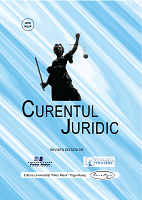THE RIGHTS OF NATURE. A NEW PARADIGM (I)
THE RIGHTS OF NATURE. A NEW PARADIGM (I)
Author(s): Lucreţia Dogaru, Antonia Diana DogaruSubject(s): Law, Constitution, Jurisprudence, Energy and Environmental Studies, Environmental and Energy policy, Environmental interactions
Published by: Editura University Press, Universitatea de Medicina, Farmacie, Stiinte si Tehnologie “George Emil Palade” din Targu Mures
Keywords: Rights of Nature; environment protection; subject of law; climate change;
Summary/Abstract: Despite the proliferation of environmental legislation, the destruction of the natural world persists and even worsens. We think that, an essential reason for this situation is that most normative frameworks treat nature as an object, and thus tend towards an approach that does not protect the environment but leads to the commercialization of nature's ecosystems. It is becoming increasingly clear that the current environmental regulations are the result of the dualistic, mechanistic and anthropocentric vision, according to which humanity is the master and owner of nature, so that environmental law remains seriously anchored in its philosophical preconceptions, maintaining over time the unwavering belief of private property as the sole guardian of the environment, of the idea that nature must be protected and valued only from the perspective of its usefulness. (Armstrong, 2012) (Gutwirth, 2001) (Darpo, 2021) That is why the recognition of the Rights of Nature together with the Human Rights aims to change this paradigm. One positive aspect, even if only at the discourse and political level, is that, in the last period it is observed that the anthropocentric approach that commodities ecosystems is increasingly questioned, while the holistic, dynamic and multidimensional approach, which allows the support and protection of nature, is gradually emerging. In this paper, we will present and analyse how the recognition of the Rights of Nature together with Human Rights can lead through changing the old paradigm. And the reason why the anthropocentric approach of nature and ecosystems as commodity is frequently questioned, in contrast to the holistic, dynamic and multidimensional approach, which allows the support and protection of nature. The Rights of Nature aim at a complete overhaul of the legal order regarding the old paradigms and the recognition of the dignity of the natural world. Despite serious criticism, nature is becoming, slowly but surely, the subject of full rights, rights considered as not affecting human rights, but only complement logic, as the protection of nature is ultimately limited to the people’s protection, the present and the future of mankind. The Rights of Nature involve a new approach of environmental law, through which the nature no longer expresses the set of resources that can be used by humans, but a living subject that possesses its own interests and rights. We point out that the issue of claiming the Rights of Nature arose in the international arena in the context of the Rio+20 Ecological Summit, under the impetus of the Bolivia initiative at the end of 2011, materialized in the proposal entitled " Rights of Nature", an approach in full compliance with other significantly international documents and texts (such as: the World Charter for Nature from 1982, the Rio de Janeiro Declaration from 1992, the Earth Charter adopted in 2000, the People's Summit on Climate Change and Mother Earth's Rights to Cochabamba in 2010. Of course, the issue of claiming the Rights of Nature was taken over by a lot of social movements, but also vehemently rejected and considered to be incompatible with an emancipatory project, then materialized at the level of normative acts and jurisprudence. In this paper, we will examine the status of the Rights of Nature, trying to identify a number of central themes, unifying principles, and relevant distinctions of how the discourse on these rights has been sustained in law, philosophy, and the social sciences field.
Journal: Curentul Juridic
- Issue Year: 89/2022
- Issue No: 2
- Page Range: 70-81
- Page Count: 12
- Language: English

